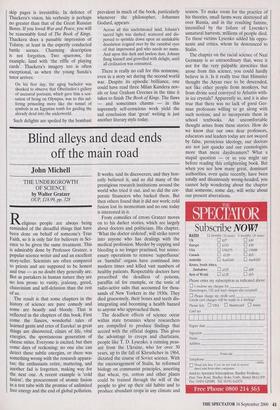Blind alleys and dead ends off the main road
John Michell
THE UNDERGROWTH OF SCIENCE by Walter Gratzer OUP, £18.99, pp. 328 Religious people are always being reminded of the dreadful things that have been done on behalf of someone's True Faith, so it is only fair for believers in Sci- ence to be given the same treatment. This is admirably done by Professor Gratzer, a popular science writer and and an excellent story-teller. Scientists are often compared to priests and are supposed to be honest and true — as no doubt they generally are. But as partakers in human nature they are no less prone to vanity, jealousy, greed, chauvinism and self-delusion than the rest of us.
The result is that some chapters in the history of science are pure comedy and some are beastly and bloody. That is reflected in the chapters of this book. First come the fiascos, wonderful tales of learned gents and cries of Eureka! as great things are discovered, elixirs of life, vital energies, the spontaneous generation of cheese mites. Everyone is excited, but then come days of reckoning; no one else can detect these subtle energies, or there was something wrong with the research appara- tus; the enthusiasts retire, muttering, and another fad is forgotten, making way for the next one. A recent example is 'cold fusion', the procurement of atomic fusion in a test tube with the promise of unlimited free energy and the end of global pollution. It works, said its discoverers, and they hon- estly believed it, and so did many of the prestigious research institutions around the world who tried it out, and so did the cor- porate financiers who backed them. But then others found that it did not work; cold fusion lost its momentum and no one today is interested in it.
From comedies of errors Gratzer moves on to his darker stories, which are largely about doctors and politicians. His chapter, `What the doctor ordered', will strike terror into anyone who has dealings with the medical profession. Murder by cupping and bleeding is no longer practised, but unnec- essary operations to remove 'superfluous' or 'harmful' organs have continued into modern times and killed vast numbers of healthy patients. Respectable doctors have prescribed the deadliest of poisons, paraffin oil for example, or the tonic of radio-active salts that accounted for thou- sands of New Yorkers in the 1930s. They died gruesomely, their bones and teeth dis- integrating and becoming a health hazard to anyone who approached them.
The deadliest effects of science occur within state tyrannies where researchers are compelled to produce findings that accord with the official dogma. This gives the advantage to creeps and charlatans, people like T. D. Lysenko, a cunning peas- ant from the Ukraine, who for over 30 years, up to the fall of Khrushchev in 1964, dictated the course of Soviet science. With the encouragement of Stalin, he reformed biology on communist principles, asserting that wheat, rye, cotton and other plants could be trained through the will of the people to give up their old habits and to produce abundant crops in any climate and season. To make room for the practice of his theories, small farms were destroyed all over Russia, and in the resulting famine, intensified by the failure of Lysenko's unnatural harvests, millions of people died. To these victims Lysenko added his oppo- nents and critics, whom he denounced to Stalin.
The chapter on the racial science of Nazi Germany is so extraordinary that, were it not for the very palpable atrocities that arose from this science, you could hardly believe in it. Is it really true that Himmler thought the Aryan race to be descended, not like other people from monkeys, but from divine seed conveyed to Atlantis with- in ice crystals? Apparently so, and it is also true that there was no lack of good Ger- man professors willing to go along with such notions, and to incorporate them in school textbooks. An uncomfortable thought arises from these stories. How do we know that our own dear professors, educators and leaders today are not swayed by false, pernicious ideology, our doctors are not just quacks and our cosmologists more than mere daydreamers? What a stupid question — or so you might say before reading this enlightening book. But when you see how many great, dominant authorities, even quite recently, have been totally and disastrously wrong-headed, you cannot help wondering about the chapter that someone, some day, will write about our present aberrations.


































































 Previous page
Previous page